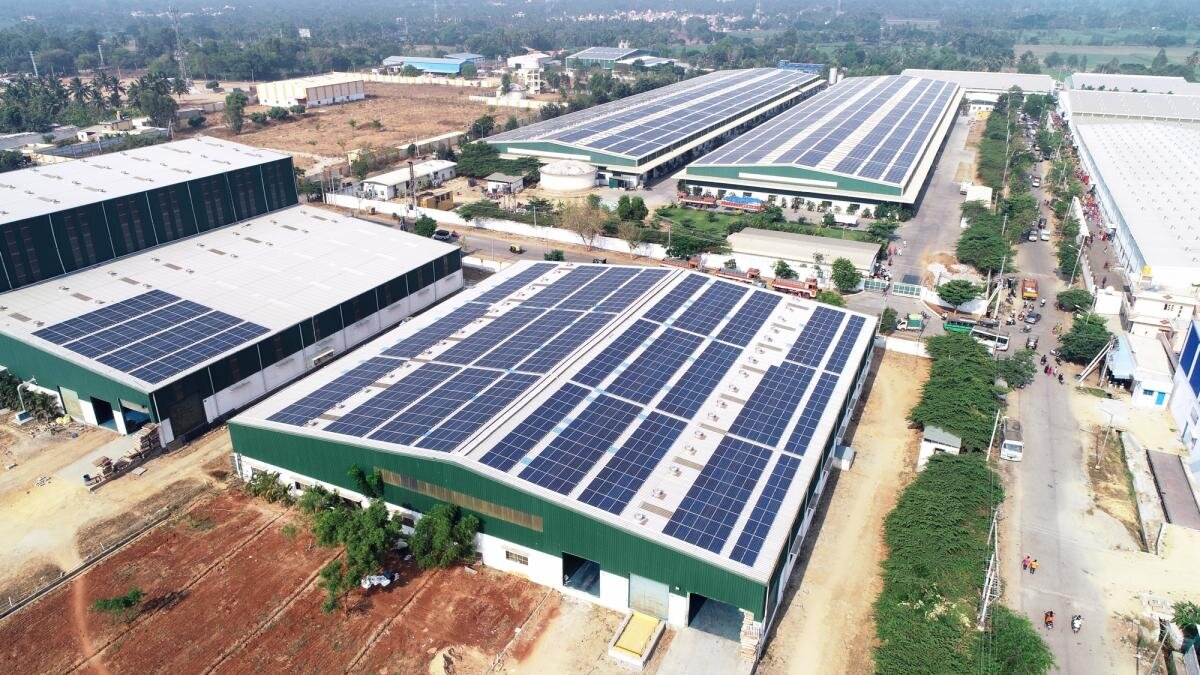After a long career with Shell, Gerald Kok switched to solar energy company Orb Energy in Bangalore. As CFO, Kok must help professionalise the fast-growing company. "I am learning even more and faster here than I did at Shell."
Project of Orb Energy in India
CFO Gerald Kok
Gerald Kok worked for Shell in The Hague, Istanbul, Colombo and New Delhi. More than a year ago, he returned to India, this time to Bangalore. And not for Shell, but for solar energy company Orb Energy. At Orb Energy, he found a fast-growing club that is supported by large investors such as Acumen, the Dutch development bank FMO, the American development bank OPIC, and, recently, Shell. Orb Energy sells solar panels to small and medium-sized companies in India. In India, companies pay more for gas and electricity than individuals, and energy prices continue to rise. So self-generation with solar panels and solar boilers is becoming increasingly attractive for companies. From Bangalore, Kok shares seven insights he gained in India.
1. Mutual trust
"Did you know that there are 50 million SMEs in India? About half of them may be unorganised, but even so the SME market is huge. For our customers, our systems are a big investment, which is why Orb Energy offers a 36-month repayment plan. This not only removes a financing hurdle, but also gives companies confidence that we will do everything possible to make the solar power system work optimally. Some Indian companies that could easily make the investment in one go, therefore, opt for our repayment scheme after all. Mutual trust is crucial when you want to sell something in India."
2. State for State
"We are mainly active in South India: Karnataka, Andhra Pradesh, Tamil Nadu and a bit in Kerala and Maharashtra. Now we want to go further into India: to Gujarat, Punjab and Rajasthan. This country is so enormous, you really have to build up a position state by state. We do that by looking for distribution partners in each state, such as installation companies or roofing companies. Very pragmatic, in other words. We also look for influential entrepreneurs who are also active in regional industry networks. Referrals from customers are very important in India. There is a lot of competition, but our reputation is good. It is to our advantage that we are an Indian company, have been around for over 12 years and make the panels ourselves in India. We only import the glass. We also employ our own maintenance people. Many Indian companies don't want them on their own payroll, but we do. Then we can educate and train them, we think it's worth it."
3. Comprehensive due diligence
"Orb Energy is experiencing strong growth, which means that the financial risks are considerable, especially since we sell systems by instalments. That has to be managed well. Many foreign companies do not want to get their fingers burnt on the SME market in India, but in doing so they miss out on a huge market. Before we deliver an expensive system on credit, we do extensive due diligence. We visit the owner of the company, investigate how they run their business and whether there is growth in the company. We even ask who the potential successor will be. This allows us to assess our risk much better. In the last three years, we have only had one customer who could not pay in the end. Any bank in India can only dream of that."
4. "Go a little slower to run faster
"Many foreign investments in India are cancelled at the last minute. During the final due diligence, it often turns out that the numbers just aren't right. When foreign investors ask about this, the owner often reacts in an irritated manner, saying 'don't you trust me? This defensive attitude on the Indian side only contributes to the mistrust of foreign investors who are then inclined to drop out. At Orb Energy, I experience this from the Indian side. We are a growth company that has attracted serious investors, but before my arrival, the budget and financial planning of Orb Energy was only in the minds of our two founders. One of the investors' requirements was to bring in a full-fledged CFO who could speak at the investor level. Before that, they didn't have one."
5. More accountant than CFO
"Most Indian SMEs do not have a CFO as we know it. They have a financial manager, a kind of bookkeeper who makes the payments. Someone who only looks backwards, in other words. Such a 'CFO' does not think about the future, about the financial risks of rapid growth, for example. That is all on the plate of the director and major shareholder. He decides everything, but often the owner has no idea of the financial implications. As soon as a foreign company knocks on the door, this mismatch becomes clear."
6. Financing of business in India
"There is a huge amount of money available for financing solar energy. Literally every day I get questions from parties who want to invest in Orb Energy. The hardest part is getting that money from a foreign party in India into the bank account. The amounts involved are substantial, so it exchange rate risk is big. Hedging that risk is always expensive. Of course, you can borrow money locally, but Indian banks are very risk averse. It is difficult for small businesses, the process is long and the administration really huge. Nevertheless, in the future we will definitely try to get a loan in India again."
7. Directive management
"The difference with Shell is of course enormous. There I was a small fish in a big pond. At Orb Energy, I am a big fish in a small pond. Now it feels more like business: every day I make decisions and we carry them out immediately. I am the boss, so our employees expect me to know how things should be done. That requires a different way of managing, very directive. It forces me to learn very quickly. I always learned a lot at Shell, but here I learn more broadly and quickly: about technology, logistics, management, and so on."




